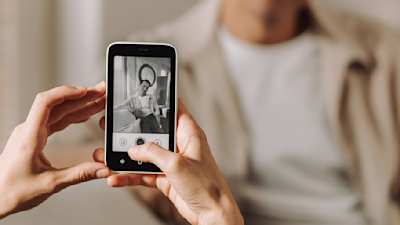
How to work efficiently in the era of hybrid work?
Is constantly working a form of FOMO?
Having the option to work from home or from the office is very flexible. Spending time with work colleagues when needed and having the option to work remotely seem like great options, however, is it even possible to be efficient and productive in a hybrid work model? Many individuals find it increasingly challenging, although at the same time they feel that they are "constantly working". They are always connected, constantly on the phone, responding to business emails at various times of the day. Additionally, workplace communication software is not at all silent after 5 p.m. Does this sound familiar? It probably does. According to a 2021 report by Owl Labs, 55% of respondents say they work more hours remotely than at the physical office. However, working more may not be the way to professional efficiency. In order to be truly productive during working hours, it's worth implementing JOMO, not only in our personal lives, but also in our business lives. [1]
JOMO, which stands for the Joy Of Missing Out, is a kind of digital detox and - is the opposite of the quite common feeling of FOMO (Fear Of Missing Out) syndrome. Unfortunately, FOMO seems to be a sign of our times. We're afraid of falling out of the information loop, we're afraid that if we put away the laptop or turn off the phone after business hours, we'll miss something important in the company (and beyond). We can't seem to cut ourselves off in the evening, on the weekends, even while on vacation, or during family dinner. We are constantly in "standby mode,” reaching for the phone approximately 150 times a day. Although it may seem like it provides us with inner peace and a feeling of professional efficiency, the opposite is actually true. FOMO is actually somewhat of an addiction which robs us of time for truly productive, focused deep work, in addition to preventing us from effectively resting and focusing on our personal lives outside of work. JOMO is a way to break out of this digital pattern and a path toward normalcy, so that we can be as productive as possible while working, and be able to relax and enjoy other things after work. [2]
Unplug and reset
Being constantly "at work" is unhealthy because it does not allow our mind to unplug. The human brain is not capable of functioning properly when it’s operating at peak performance without any breaks. Your brain needs a rest every now and then, even a few minutes every hour or so, in addition to a longer period of rest after a standard work day. What’s important to point out is that, our mind also rests when it is occupied with something completely different from work during breaks. Therefore, if you work remotely and are in front of a computer most of the time, it’s advisable not to take a break from your tasks by browsing social media on your phone or online shopping. Try doing something that does not involve digital technology, such as taking a walk, meditating, reading a book, or playing with the dog. Even taking a power nap is a better option than attempting to recharge your batteries in front of yet another screen. Offline relaxation allows you to recover better and work more efficiently when you return to your desk.
Enjoy your time offline
JOMO is not so much about " depriving ourselves" as it is a way to discover and enjoy something different. By leaving the house without your smartphone or turning off the computer for the weekend, we are disconnecting ourselves from the digital world, while giving ourselves a chance to experience and enjoy the world offline. After all, humans are analog creatures. When we intentionally disconnect, we can finally focus on all that is happening beyond the screens of smartphones, tablets and laptops. Over time, we can find that this way of spending time is also quite rewarding. Until recently, the need for JOMO was primarily noticed in those career-focused individuals, whose whole existence was based on always being available, well-informed, ready to take on new challenges and always online.
Tired of the corporate rat-race, and motivated by the changes which have taken place in the labor market, JOMO is gaining popularity with most office workers. It's no longer just a big-city fad, as it once was, but an outright necessity.
Start with something simple
Although JOMO is really fun, some may find getting started a little difficult. If you've been working remotely for a long time, you may find yourself available almost all day (even outside of working hours) to the company and colleagues via email, chats and other communication channels. Because, let’s be frank, home office or hybrid work, unfortunately, tends to usually look like this, while it extends beyond normal business hours. Additionally, don't deceive yourself, you won't suddenly turn off all electronic devices, quit your job and live off grid in a hut. That's not the point. The main goal is to set boundaries which include time for online professional activities and time for offline relaxation. It's that simple. That's all there is to it.
So where should you start? Even though you’re working from home, start by establishing your working hours at home. In a previous article, we discussed how to avoid the work/personal life blur while working remotely. Adopt a rule that, for example, you won’t respond to any emails on Sunday. Or perhaps, when you take the dog for a walk or go for a jog in the morning, you won’t take your smartphone with you, etc. Subsequently, you can extend JOMO to evenings, weekends and maybe even have a real offline holiday. Although it may not seem easy at first, these changes, counterintuitively, will help you to be efficient and stay focused at work.
Additionally, focus on taking more breaks, and for longer periods of time, from your smartphone during the day, and even create places in the house without the Internet and electronics, like your bedroom. If you’re using your smartphone as an alarm clock, swap it for a sleek & modern Mudita alarm clock, like the Mudita Harmony or Mudita Bell. Better yet, create an offline bedtime routine approximately 60-90 minutes before you go to sleep, in order to properly disengage from the chaos of the day, allowing your body to relax and unwind.
By setting boundaries and implementing changes into your daily routine, you can easily find the balance between your work life and personal life.
If you enjoyed this article, please check out similar ones featured on the Mudita Blog and learn more about how to increase your concentration and be more productive.
Discover how intentionally unplugging can help you achieve better work/life balance
To learn more about Mudita, take a look at our website and our other posts. If you enjoyed reading this article, please share and recommend it.
Related stories

Why You Can’t Sleep (And What to Do About It)
Struggling with sleepless nights? Discover what's keeping you awake & learn practical solutions from Mudita to improve your sleep quality.

March is Sleep Awareness Month: Time to Reset & Rest
March is Sleep Awareness Month! Learn how sleep impacts health, focus & well-being, and get expert tips to reset your routine for better, healthier rest.

How to Get a Better Tech-Life Balance
Learn practical strategies to reduce screen time & achieve tech-life balance through actionable tips for digital wellness & create healthier technology habits.
If you'd like to receive the best stories from our blog, keep up to date with our progress and get notified about our product releases and special discounts.